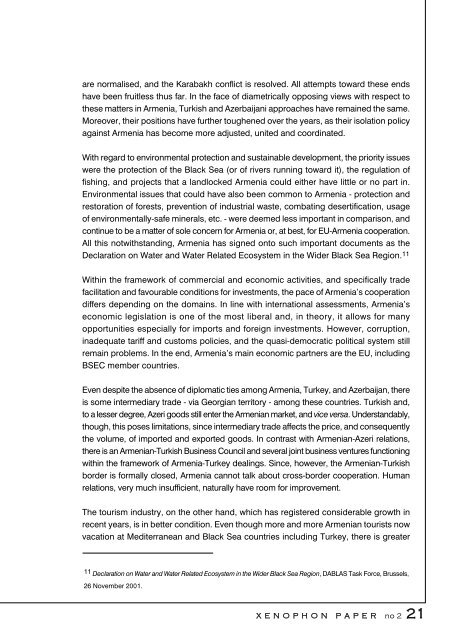Xenophon Paper 2 pdf - ICBSS
Xenophon Paper 2 pdf - ICBSS
Xenophon Paper 2 pdf - ICBSS
You also want an ePaper? Increase the reach of your titles
YUMPU automatically turns print PDFs into web optimized ePapers that Google loves.
are normalised, and the Karabakh conflict is resolved. All attempts toward these ends<br />
have been fruitless thus far. In the face of diametrically opposing views with respect to<br />
these matters in Armenia, Turkish and Azerbaijani approaches have remained the same.<br />
Moreover, their positions have further toughened over the years, as their isolation policy<br />
against Armenia has become more adjusted, united and coordinated.<br />
With regard to environmental protection and sustainable development, the priority issues<br />
were the protection of the Black Sea (or of rivers running toward it), the regulation of<br />
fishing, and projects that a landlocked Armenia could either have little or no part in.<br />
Environmental issues that could have also been common to Armenia - protection and<br />
restoration of forests, prevention of industrial waste, combating desertification, usage<br />
of environmentally-safe minerals, etc. - were deemed less important in comparison, and<br />
continue to be a matter of sole concern for Armenia or, at best, for EU-Armenia cooperation.<br />
All this notwithstanding, Armenia has signed onto such important documents as the<br />
Declaration on Water and Water Related Ecosystem in the Wider Black Sea Region. 11<br />
Within the framework of commercial and economic activities, and specifically trade<br />
facilitation and favourable conditions for investments, the pace of Armenia’s cooperation<br />
differs depending on the domains. In line with international assessments, Armenia’s<br />
economic legislation is one of the most liberal and, in theory, it allows for many<br />
opportunities especially for imports and foreign investments. However, corruption,<br />
inadequate tariff and customs policies, and the quasi-democratic political system still<br />
remain problems. In the end, Armenia’s main economic partners are the EU, including<br />
BSEC member countries.<br />
Even despite the absence of diplomatic ties among Armenia, Turkey, and Azerbaijan, there<br />
is some intermediary trade - via Georgian territory - among these countries. Turkish and,<br />
to a lesser degree, Azeri goods still enter the Armenian market, and vice versa. Understandably,<br />
though, this poses limitations, since intermediary trade affects the price, and consequently<br />
the volume, of imported and exported goods. In contrast with Armenian-Azeri relations,<br />
there is an Armenian-Turkish Business Council and several joint business ventures functioning<br />
within the framework of Armenia-Turkey dealings. Since, however, the Armenian-Turkish<br />
border is formally closed, Armenia cannot talk about cross-border cooperation. Human<br />
relations, very much insufficient, naturally have room for improvement.<br />
The tourism industry, on the other hand, which has registered considerable growth in<br />
recent years, is in better condition. Even though more and more Armenian tourists now<br />
vacation at Mediterranean and Black Sea countries including Turkey, there is greater<br />
11 Declaration on Water and Water Related Ecosystem in the Wider Black Sea Region, DABLAS Task Force, Brussels,<br />
26 November 2001.<br />
X E N O P H O N P A P E R no 2 21









